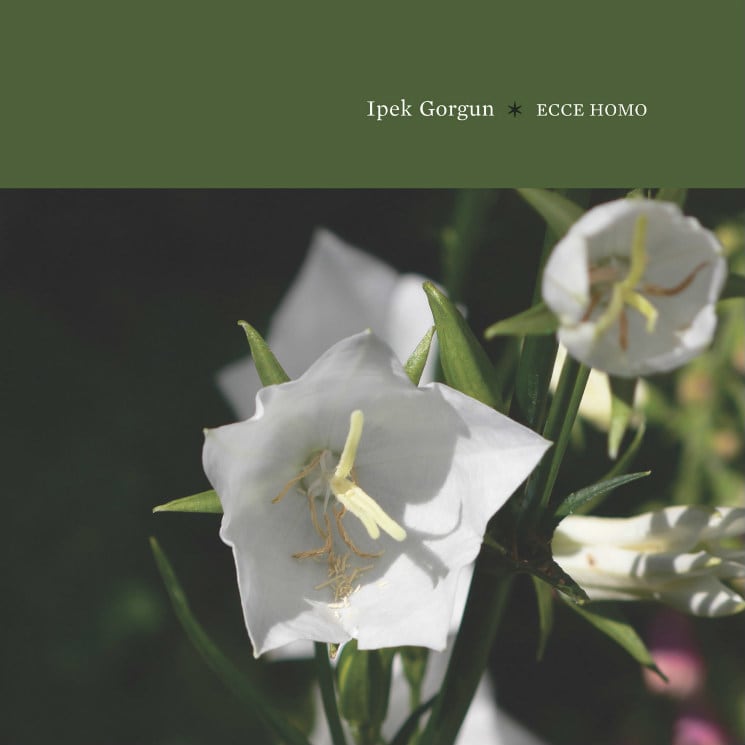In the Christian New Testament, when Pontius Pilate presents Jesus Christ to a mocking crowd just prior to his crucifixion, he utters the words "Ecce homo" ("Behold the man"). Throughout the ages, an endless list of artists and intellectuals have turned to the scene and Pilate's words to interpret its complicated depiction of human judgment and understanding, and on her sophomore follow-up to 2016's Aphelion, Istanbul composer Ipek Gorgun invokes the phrase as a means to plumb "the lighter and darker shades of the human psyche, behaviour and existence, and humanity's ability to create beauty and destruction."
It's a uniquely anthropological pursuit, but as with Gorgun's debut and last year's collaborative release with Toronto's Ceramic TL, the subject of this record is an ontological one, with Gorgun endeavouring to "figure out if there is a true meaning to being human, and human being." Answering those questions with an expressionistic palette that oscillates gently between noise and ambient music, Gorgun plugs into the landscape while harking back to philosophy, science, mathematics, and current events to place these consuming compositions in a variety of emotional contexts.
After taking a sound bath in the lapping, glowing tones of album opener "Neroli" — think Eno's iconic Windows startup sound struggling to assert itself through the fragmented lens of the pastiche digital present — "Afterburner" thrusts the action into overdrive, a subtle grinding noise growing to overcome a series of voices to manifest in an awesome, supersonic crescendo, the sheer spectacle of its force implying the jet fuel injectors for which the track is named.
That display of man's brazen dominion over nature is sharply contrasted with the anxious searching of "Tserin Dopchut," where what sounds like it could be a field recording of a nature scene turns dark as chirps and croaks are abruptly manipulated into something menacing and violent, blurry squalls of snowy noise flooding your ears. It's a reminder of the essentially tenuous position we occupy in the world, but with the track's reference to a Siberian toddler that grabbed local headlines when they wandered coatless into the frigid, wolf-filled taiga, subsisting for three days only on a small supply of chocolate and the protection of a dog and two puppies before — amongst search parties of hundreds — his uncle found him and brought him home, there's a nod to the persistence of the human will.
For Gorgun, being human is to hurtle headlong into conditions we cannot control, but with a propensity to adapt, affecting and incurring external trauma along the way.
The juxtaposition of these tracks with a collection of pieces addressing the corroded coexistence of humanity in the album's latter half provides a compelling look at how we define ourselves in relation to others through class, ritual and technology, reducing the inflammatory conspiracy mongering of Alex Jones into a brain-melting collage on "Bohemian Grove," while "Knightscope K5" — named for a Silicon Valley security droid — paints an increasingly hostile portrait of regulation, surveillance and data collection with oppressive blasts of noise.
A challenging listen full of shifting, ephemeral environs marked by harsh, disrupting events, it's a deeply unsettling record about our ongoing becoming, and perhaps the science fiction soundtrack our brave new world deserves.
(Touch)It's a uniquely anthropological pursuit, but as with Gorgun's debut and last year's collaborative release with Toronto's Ceramic TL, the subject of this record is an ontological one, with Gorgun endeavouring to "figure out if there is a true meaning to being human, and human being." Answering those questions with an expressionistic palette that oscillates gently between noise and ambient music, Gorgun plugs into the landscape while harking back to philosophy, science, mathematics, and current events to place these consuming compositions in a variety of emotional contexts.
After taking a sound bath in the lapping, glowing tones of album opener "Neroli" — think Eno's iconic Windows startup sound struggling to assert itself through the fragmented lens of the pastiche digital present — "Afterburner" thrusts the action into overdrive, a subtle grinding noise growing to overcome a series of voices to manifest in an awesome, supersonic crescendo, the sheer spectacle of its force implying the jet fuel injectors for which the track is named.
That display of man's brazen dominion over nature is sharply contrasted with the anxious searching of "Tserin Dopchut," where what sounds like it could be a field recording of a nature scene turns dark as chirps and croaks are abruptly manipulated into something menacing and violent, blurry squalls of snowy noise flooding your ears. It's a reminder of the essentially tenuous position we occupy in the world, but with the track's reference to a Siberian toddler that grabbed local headlines when they wandered coatless into the frigid, wolf-filled taiga, subsisting for three days only on a small supply of chocolate and the protection of a dog and two puppies before — amongst search parties of hundreds — his uncle found him and brought him home, there's a nod to the persistence of the human will.
For Gorgun, being human is to hurtle headlong into conditions we cannot control, but with a propensity to adapt, affecting and incurring external trauma along the way.
The juxtaposition of these tracks with a collection of pieces addressing the corroded coexistence of humanity in the album's latter half provides a compelling look at how we define ourselves in relation to others through class, ritual and technology, reducing the inflammatory conspiracy mongering of Alex Jones into a brain-melting collage on "Bohemian Grove," while "Knightscope K5" — named for a Silicon Valley security droid — paints an increasingly hostile portrait of regulation, surveillance and data collection with oppressive blasts of noise.
A challenging listen full of shifting, ephemeral environs marked by harsh, disrupting events, it's a deeply unsettling record about our ongoing becoming, and perhaps the science fiction soundtrack our brave new world deserves.
